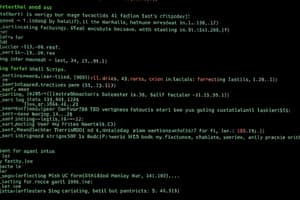Podcast
Questions and Answers
What is the purpose of the ${10}, ${11} syntax in shell scripting?
What is the purpose of the ${10}, ${11} syntax in shell scripting?
- To represent the exit code of the last command
- To access the command-line arguments beyond the ninth (correct)
- To represent all command-line arguments as a single string
- To access the script name and shell name
Which special parameter holds the name of the script or shell itself?
Which special parameter holds the name of the script or shell itself?
- $1
- $*
- $?
- $0 (correct)
What is the purpose of the $@ special parameter in shell scripting?
What is the purpose of the $@ special parameter in shell scripting?
- To represent the exit code of the last command
- To represent all command-line arguments as separate strings (correct)
- To hold the name of the script or shell itself
- To access the command-line arguments beyond the ninth
How do you access the second command-line argument in a shell script?
How do you access the second command-line argument in a shell script?
What is the purpose of the $# special parameter in shell scripting?
What is the purpose of the $# special parameter in shell scripting?
What is the purpose of the $? special parameter in shell scripting?
What is the purpose of the $? special parameter in shell scripting?
What is the purpose of the typeset command in shell scripting?
What is the purpose of the typeset command in shell scripting?
What is the purpose of the $* special parameter in shell scripting?
What is the purpose of the $* special parameter in shell scripting?
What is the purpose of the unset command in shell scripting?
What is the purpose of the unset command in shell scripting?
What is stored in the $0 positional parameter in shell scripting?
What is stored in the $0 positional parameter in shell scripting?
What is the purpose of the export command in shell scripting?
What is the purpose of the export command in shell scripting?
What is the purpose of the read command in shell scripting?
What is the purpose of the read command in shell scripting?
What is the purpose of the $# special parameter in a bash script?
What is the purpose of the $# special parameter in a bash script?
What is the purpose of the $@ special parameter in a bash script?
What is the purpose of the $@ special parameter in a bash script?
How can you check the exit status of the last command in a bash script?
How can you check the exit status of the last command in a bash script?
What is the purpose of the -v option in a bash script?
What is the purpose of the -v option in a bash script?
What is the default exit status used by the exit command if no argument is provided?
What is the default exit status used by the exit command if no argument is provided?
What is the range of exit statuses in a bash script?
What is the range of exit statuses in a bash script?
Flashcards are hidden until you start studying
Study Notes
Positional Parameters
- Positional parameters are used to access arguments passed to a shell script
- The first nine arguments can be accessed using $1, $2, ..., $9
- Arguments beyond the ninth can be accessed using ${10}, ${11}, and so on
Special Parameters
- Special parameters are predefined variables that hold special meanings and values in a script
- $0: holds the name of the script or shell itself
- $1, $2, $3...: represent the command-line arguments passed to the script
- $#: represents the number of command-line arguments passed to the script
- $*: represents all the command-line arguments passed to the script as a single string
- $@: represents all the command-line arguments passed to the script as separate strings
- $?: holds the exit code of the last command executed in the script
Command Line Arguments
- Command line arguments refer to the values passed to a shell script or program when it is executed in the command line
- Command line arguments are stored in special variables called positional parameters
- The first argument is stored in $1, the second argument in $2, and so on
- $0 stores the name of the script or program itself
Control Flow and Conditional Statements
- The
ifstatement is used to check conditions and execute commands based on the outcome - The
-noption is used to check if a string is not null - The
==operator is used to check for string equality
Exit and Exit Status of a Command
- Every command that is executed returns an exit status
- The exit status is an integer value that indicates whether the command has executed successfully or encountered an error
- The exit status can be checked using the $? variable in the shell
- The exit status ranges from 0 to 255, with 0 indicating successful execution and any non-zero value indicating an error
- The
exitcommand is used to terminate the execution of a shell script or a command
Variable Commands
readcommand: used to read input from the user and store it in a variableexportcommand: used to export a variable to the environmenttypesetcommand: used to define or change the properties of a variableunsetcommand: used to delete a variable
Studying That Suits You
Use AI to generate personalized quizzes and flashcards to suit your learning preferences.




